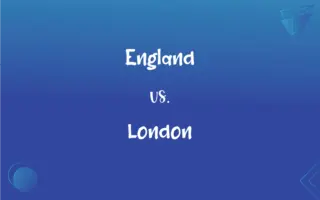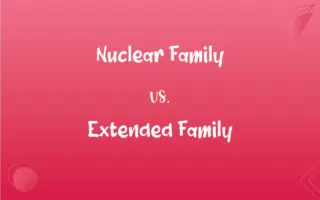Water vs. Liquid: What's the Difference?
Edited by Harlon Moss || By Janet White || Published on January 25, 2024
Water is a specific, naturally occurring liquid substance composed of hydrogen and oxygen, while liquid is a state of matter that flows and conforms to container shape.

Key Differences
Water is a specific chemical substance with the formula H2O, known for its essential role in the biological processes of all known living organisms. In contrast, liquid is a state of matter characterized by its ability to flow and take the shape of its container. While water is always a liquid under standard conditions, liquids can be made up of a vast range of substances, not just water.
The properties of water, such as its boiling and freezing points, surface tension, and ability to dissolve many substances, are specific to it. These properties are essential for various biological, chemical, and physical processes. On the other hand, the properties of liquids in general, such as viscosity, density, and pressure, can vary widely depending on their chemical composition.
Water is a tasteless, odorless, and transparent liquid at room temperature and pressure, making it unique among other liquids. Other liquids can have various colors, tastes, and odors, depending on their chemical makeup. For example, oil is a liquid that is different in appearance and behavior from water.
In environmental contexts, water is crucial for ecosystems and human activities, existing in natural bodies like oceans, rivers, and lakes. Liquids, as a broader category, are used in a multitude of applications ranging from industrial solvents to cooking oils, each with its specific role and characteristics.
In terms of chemical behavior, water is a polar molecule, which gives it the ability to dissolve many other substances, earning it the nickname "universal solvent." The behavior of other liquids depends on their molecular structure, which can range from polar to nonpolar, influencing their interactions with other substances.
ADVERTISEMENT
Comparison Chart
Composition
H2O (hydrogen and oxygen)
Can be any substance in liquid state
Properties
Boiling point 100°C, freezing point 0°C
Varies widely (oil, alcohol, etc.)
State at Room Temperature
Always liquid
Depends on the substance
Role in Nature
Essential for life, forms natural bodies
Can be natural or synthetic
Chemical Behavior
Polar, universal solvent
Can be polar or nonpolar
ADVERTISEMENT
Water and Liquid Definitions
Water
Chemical formula H2O, consisting of hydrogen and oxygen.
Water's unique properties are due to its H2O structure.
Liquid
Varies in properties like viscosity, color, and density.
The thick liquid was used as a lubricant in the machine.
Water
A transparent, odorless liquid at room temperature.
She filled her glass with water from the tap.
Liquid
A state of matter that flows and takes the shape of its container.
The liquid mercury spilled and spread across the table.
Water
Essential for life, found in rivers, lakes, and oceans.
The river was a vital source of water for the village.
Liquid
Can be any substance in a fluid state, not just water.
She poured a sweet-smelling liquid into the mixture.
Water
It exists in three states: liquid, solid (ice), and gas (vapor).
The water in the lake froze into ice in winter.
Liquid
Essential in various applications from cooking to industrial processes.
He used a special liquid to clean the electronic components.
Water
Used in cooking, cleaning, and industrial processes.
He used water to boil pasta for dinner.
Liquid
Can be found in natural and synthetic forms.
The factory produced a variety of industrial liquids.
Water
A clear, colorless, odorless, and tasteless liquid, H2O, essential for most plant and animal life and the most widely used of all solvents. Freezing point 0°C (32°F); boiling point 100°C (212°F); specific gravity (4°C) 1.0000; weight per gallon (15°C) 8.338 pounds (3.782 kilograms).
Liquid
The state of matter in which a substance exhibits a characteristic readiness to flow and little or no tendency to disperse, and is amorphous but has a fixed volume and is difficult to compress.
Water
Any of various forms of water
Waste water.
Liquid
Matter or a specific body of matter in this state.
FAQs
What is the chemical composition of water?
H2O, consisting of two hydrogen atoms and one oxygen atom.
Is water always tasteless and odorless?
Typically, yes, in its pure form.
What defines a liquid?
A state of matter that flows and takes the shape of its container.
Can liquids vary in color?
Yes, they can be clear, colored, or opaque.
Can water exist in states other than liquid?
Yes, as ice (solid) and vapor (gas).
Is water a good solvent?
Yes, it's known as the universal solvent.
Where is water found in nature?
In oceans, rivers, lakes, and as groundwater.
Are synthetic liquids man-made?
Yes, they are created through industrial processes.
Do all liquids have the same viscosity?
No, viscosity varies widely among liquids.
Are all liquids water?
No, liquids include a wide range of substances.
Can liquids be gases at room temperature?
Some can, depending on their boiling point.
Is water renewable?
Yes, through the Earth's water cycle.
Do all liquids evaporate?
Yes, but at different rates.
How is water purified?
Through filtration, distillation, or chemical treatment.
Do all liquids freeze?
Yes, but at different temperatures.
How is water used in industries?
For cooling, processing, and as a solvent.
What is the boiling point of water?
100°C (212°F) at sea level.
Can liquids be mixed?
Yes, but some may not mix well, like oil and water.
Are all liquids safe to drink?
No, only specific liquids like clean water are safe for consumption.
Is drinking water essential for health?
Yes, it's vital for hydration and bodily functions.
About Author
Written by
Janet WhiteJanet White has been an esteemed writer and blogger for Difference Wiki. Holding a Master's degree in Science and Medical Journalism from the prestigious Boston University, she has consistently demonstrated her expertise and passion for her field. When she's not immersed in her work, Janet relishes her time exercising, delving into a good book, and cherishing moments with friends and family.
Edited by
Harlon MossHarlon is a seasoned quality moderator and accomplished content writer for Difference Wiki. An alumnus of the prestigious University of California, he earned his degree in Computer Science. Leveraging his academic background, Harlon brings a meticulous and informed perspective to his work, ensuring content accuracy and excellence.































































